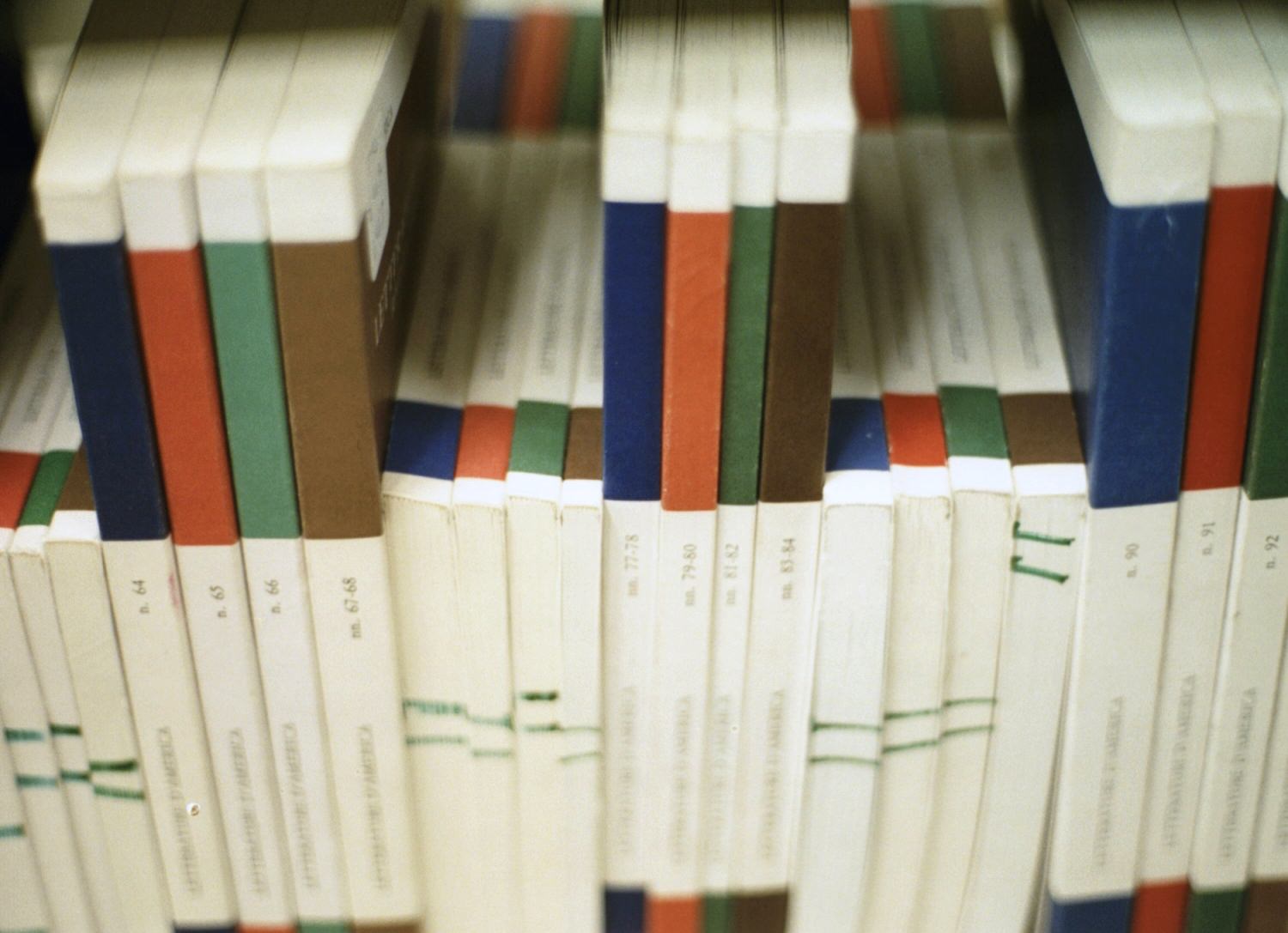recent
How Ideologues Captured the Canadian Publishing Industry
Publishing is not a career one chooses for the money.

In 2016, when I enrolled in the Master of Publishing program at Simon Fraser University’s Vancouver, B.C. campus, I had expected to find an industry of like-minded professionals who shared my love of the written word. And I did indeed meet many such colleagues. But I also got a glimpse into an industry that has become politicized to an extent that I scarcely could have imagined.
Publishing is not a career one chooses for the money. Nearly all areas of the industry are suffering economically. But since embarking on this course of study, I’ve found myself confronting challenges that have nothing to do with money. Regular Quillette readers will be aware that political and ideological forces have constrained the range of acceptable content in artistically and academically rarified fields such as creative writing (including poetry), media studies, music and performance art. What might be less appreciated is the manner by which these same forces are exerting pressure on the more mainstream area of publishing.
At Simon Fraser University (SFU), the MPub degree (as it’s commonly known) graduated its first class in 1995. Although the program was created within the university system, it was designed to operate at arm’s length from standard academic operations, and instead was structured as a guided exercise in professional immersion. During its early years, MPub program leaders not only looked to industry leaders for guidance, but also for funding. Publishers contributed financially to the program (as some still do); and, in exchange, used the program as a recruiting ground for new hires. The MPub web site boasts that it is “the only program in Canada to offer a postgraduate degree in publishing, and is the country’s premier training ground for publishing professionals.”
The publishing classes in those first years—largely book- and magazine-oriented project-simulation courses—were taught by industry veterans, some of whom had worked in publishing for decades without having obtained even an undergraduate degree. In keeping with the department’s pragmatic mandate, actual experience was valued at least as much as academic credentials.
After the founder and original department head retired, however, the MPub program turned away from a primarily industry-based approach, and is now run by staff and faculty—about half of whom are program alumni—mostly drawn from academia. Their influence is on clear display in the seminar classes, whose content struck me as being largely unrelated to any practical aspect of publishing, and instead seems designed to indoctrinate students in avant-garde theories of feminism, intersectionality and activism. Conversations in these classes frequently centred on the allegedly “ruinous” state of the Canadian literary scene (aka “CanLit”), a state of ruination that was traced specifically to the white male authors and staff who, we were told, dominate the industry for their own benefit. (This seemed strange to me since the MPub program itself is dominated by women. My own cohort, for instance, was 100% female. The banner photo on the program’s site suggests this imbalance isn’t unusual.)
In a 2018 Globe & Mail column, “CanLit Isn’t What It Used to Be,” critic Russell Smith noted that “humanities departments see themselves increasingly as having a revolutionary social-justice role that is just as important as—even inseparable from—their educational mandate.” Smith also noted that one of the reasons why CanLit has become so suffused with social-justice orthodoxy is that many writers can’t make a living on the basis of their published work, so they take jobs within bureaucratized (and often ideologically monolithic) universities, where faculty-lounge groupthink leaches into scholarship and art. My experience in the MPub program would seem to exemplify this trend.
One of the courses I took during my second semester required the submission of two essays, the second of which I wrote about the then-developing trend whereby non-fiction authors established podcasting platforms as a means of connecting with audiences while scaling up critical discourse. I drew on Sam Harris and Jordan Peterson as two cases studies.
When I initially met with my professor to discuss the scope and direction of my essay, he told me that he was not aware of Peterson or his work. Later, when prefacing his feedback on my essay, he declared “Oh, that Jordan Peterson,” followed by disparaging comments about Peterson’s Twitter feed. I was then specifically warned off writing “about personal pronouns,” or else “we’d be here a long time.” I had to remind myself that my essay was ostensibly about leveraging one medium (podcasts) to complement another (published books), and had nothing to do with ideology. The professor explained to me that another scholar, who recently had participated in a panel debate with Peterson on academic freedom and the use of gendered pronouns, had been his own PhD supervisor at the University of British Columbia. It seemed very important that I understand the extent of this person’s disapproval of Jordan Peterson and the ideas he stood for.

I should note that this professor had been brought in to evaluate my previously submitted essay for the course—after another professor, who’d originally been assigned to mark it, had signaled ideological disagreement with my premises. That essay explored the contemporary publishing industry’s fixation on pre-empting complaints about offensive content through the use of “sensitivity readers.” I also discussed the controversial Milo Yiannopoulos book deal with Simon & Schuster, news of which had just broken (this was late 2016).
Sensitivity readers are consultants who, in theory, possesses expertise in regard to certain communities—people of colour, gay, trans, disabled individuals, etc.—and thus (again, in theory) can provide publishers and authors with valuable insight regarding the treatment of such groups in book manuscripts. In my essay, I described how skeptics of this practice, such as best-selling author Lionel Shriver, have been met with criticism—including the backlash that followed Shriver’s keynote speech at the Brisbane Writer’s Festival.
A recent article from The Guardian describes how manuscripts sent to sensitivity readers are vetted for “stereotypes, biases and problematic language,” with some sensitivity readers, such as Dhonielle Clayton, going so far as to highlight “everything from micro-word choices and phrases, to bigger meta-narrative and structure elements.” In my years as an English major, I had never heard of so-called “micro-words.” My suspicion—to which I gave voice in my essay—is that such terms may operate as pretexts for the prosecution of ideological grievances through the editorial process.
To bookend this portion of my essay, I asked whether “the publishing industry [is] responsible for the potential offense experienced by readers of a text?” and whether “this level of moral judgment [can] be fairly extended to fiction, where characters and many settings are made up by authors?” My professors disagreed—not only with the positions I took, but in fact with the validity of even asking these questions.
As part of the feedback process, I was told that MPub students should be striving toward a “higher level of social conscience: one where we don’t just ask what the publisher’s responsibility is to hold itself to account, but rather where our collective responsibility as a society is to hold the publisher to account.” My own view is that publishers should operate with their customer in mind. But my professors repeatedly emphasized the manner by which such a mindset could hurt the “collective.” In one feedback note, I was told that “appealing to ‘market logic’ or ‘business decisions,’ or any other facade is to do an injustice to our future.” The word “diversity” was flung about liberally.
The Canadian Institute for Studies in Publishing, which is the research arm of SFU’s publishing department, has a research objective labelled “Publishing as Social Change.” The two key questions posed, “How can publishers contribute to advancing and supporting social change?” and “What issues and considerations must be addressed in order to create a publishing industry that is fair, inclusive, and accountable?” serve to parrot the above feedback from my professor. Thus, the activist bent of the program is rooted not only in lectures and seminar discussions, but also is baked into the department’s research mandate.
(Last year, independent publisher BookThug released Refuse: CanLit in Ruins, a collection of essays co-edited by MPub Assistant Professor Hannah McGregor that purports to lay bare “the accepted injustices” that define CanLit. SFU’s publishing department publicly promotes the book as one of three “recent projects focussing on publishing from a social change perspective.” Strangely, it would seem that the same program that markets itself as “the country’s premier training ground for publishing professionals” is also taking the position that this same industry is so plagued by injustices as to now lie in a state of “ruins.”)
SFU’s MPub program is just one tiny slice of the Canadian academic landscape. And it employs just a handful of academics in a boutique department. But out of this small operation comes many of the professionals who staff a wide range of positions within a culturally influential industry. Examine the mission statements or taglines from Canadian independent publishers, and you find specimens such as “Canadian indie literary press committed to publishing contemporary & diverse voices” and “Publishing dynamic new voices in #CanLit, #poetry, #fiction. Collaborative, inviting, diverse & vital community of #literary #writers & readers.” As in my courses, “diversity” is the word that comes up most commonly. But as you might guess, that doesn’t mean a diversity of actual ideas or perspectives.
Canadian book publishers receive a significant amount of government funding every year. A primary source comes in the form of grants issued by the Canada Council for the Arts, a federal Crown Corporation whose mandate is “to foster and promote the study and enjoyment of, and the production of works in, the arts.” The organization reports to Canadian Parliament through the Minister of Canadian Heritage, as well as through the submission of regular reports to various departments, which include action plans and updates in regard to program requirements mandated by the Official Languages Act, the Canadian Multiculturalism Act, the Employment Equity Act and so on.
Curious about what it takes to get Canada Council funding, I read through a preview version of the latest Program Guidelines and Application Form for the funding stream designated as “Supporting Artistic Practice.” Eligible book publishers can be awarded up to $250,000 per year, and eligible literary magazines receive up to $120,000—in both cases, “toward activities that develop and promote Canadian literary writers through the publishing process.”
A major component of the assessment, comprising 30% of the total score, pertains to the expected “impact” of a publisher’s output. To score high in this category, publishers must demonstrate that their publishing programs contribute to the advancement of Canadian literature. They also must demonstrate “a commitment to reflecting—through [their] editorial choices, organizational make-up and development of [their] readership—the diversity of Canada, particularly with regards to the inclusion of Aboriginal Peoples, culturally diverse groups, people who are Deaf or have disabilities, and official language minority communities.” Moreover, publishers receiving Canada Council funding should demonstrate “a commitment to advancing gender parity” (an odd point given that, according to the industry data I’ve seen, almost 80% of publishing staff are women).
There are a small number of large Canadian publishers that produce mass market books, and would survive without government funding. But the majority of publishers in Canada are small. Especially in the case of those publishers specializing in poetry and literary fiction, government subsidies represent the lion’s share of income. Indeed, the revenue streams these publishers get from the Canada Council and its provincial counterparts often dwarf actual sales revenue. And so I cannot just blame the academy for what has happened to this industry: A tendency toward social-justice groupthink and bureaucratically imposed notions of diversity has been baked directly into the defined funding requirements that keep most Canadian publishers solvent.
This trend is not isolated to Canada. And even those companies that don’t rely on government funding are imposing their own litmus tests, as the British offices of Penguin Random House demonstrated when a company official declared recently that “we want our authors and new colleagues to reflect the UK population taking into account ethnicity, gender, sexuality, social mobility and disability.” Never one to shy away from a fight on these issues, the aforementioned Lionel Shriver noted in the Spectator: “Literary excellence will [now] be secondary to ticking all those ethnicity, gender, disability, sexual preference and crap-education boxes.” Shortly after Shriver published her thoughts on the issue (which I believe are widely shared, even if few have the courage to signal their agreement publicly), the British literary magazine Mslexia rescinded an invitation for her to judge a writing contest.
In some cases, writers whose voices are deemed to be marginalized according to official quota keepers are themselves faced with scrutiny or even backlash if their views are deemed controversial by some members of their own community. Most of the same Canadian publishers who claim they want to recruit more writers of colour, for instance, would be horrified if one of their editors signed up a black writer arguing for, say, smaller government, or an outspoken female writer who attends pro-life demonstrations. Ditto a trans writer who wanted to make the case against stricter hate-speech laws.
Yasmine Mohammed is an Arab-Canadian college instructor, activist and writer who grew up in a fundamentalist Islamic household. Her unpublished memoir—titled From Al-Qaeda to Atheism—is about her upbringing, her forced marriage to a member of al-Qaeda, and her eventual escape with her daughter. Two years ago, Mohammed began submitting her manuscript to publishers and literary agents—totalling over 100 submissions to date.
Mohammed has over 100,000 followers on her combined social media platforms, and has written for national newspapers. Videos featuring her interview on the popular Rubin Report podcast have been viewed over 250,000 times, and her commentary has been featured in media outlets around the world. Mohammed also comes with a glowing recommendation from Ayaan Hirsi Ali, a best-selling Somali-born activist who founded a US-based non-profit that leads programs to protect women and promote reform in the Muslim world. All of this makes her orders of magnitude better known than your average Canadian first-time book author. But as of this writing, she still can’t find a Canadian publisher. One agent, I am informed, said he “doesn’t want to be bothered” dealing with a new author writing on “a controversial topic.”
“I do not think there is [actual] diversity,” Mohammed told me during a recent email exchange. “I think the publishing industry is interested in many different coloured people all regurgitating the same approved narratives…books [like Muslim Girl by Amani Al-Khatahtbeh, which tell] of how America is so Islamophobic and how [Al-Khatahtbeh] is so oppressed by the American people, and her book is a best-seller. That is the popular, self-flagellating rhetoric that is eagerly published.”
There are many reasons why an author may have his or her manuscript rejected, so it’s impossible to prove that Mohammed has fallen victim to ideological blackballing. But many Canadian publishers produce books that sell, on average, only a few hundred—or even a few dozen—copies. So it’s conceivable, if not likely, that From Al-Qaeda to Atheism would sell more copies in a month than many of these publishers’ entire catalogues sell in a year. Yasmine has recently been taken on by the London-based literary and talent agency Peters Fraser + Dunlop. But the fact that no one in Canada has picked up her book strikes me as suspect, at the very least.
Public subsidies have been part of Canadian cultural life for decades, because it was thought that without them, our publishing, performance, and broadcast industries would be swamped by American cultural imports. But it has now become clear that the cure is worse than the disease—for these policies now serve to enforce a faux-diversity that systematically drives grant-seeking publishers to embrace the same material year after year in what Shriver accurately describes as ticking “crap-education boxes.”

In a recently published report on Canadian publishing, we can see where this leads: Canadian-authored books now represent just 15% of Canadian book purchases. Independent Canadian publishers’ sales are down by 44% across the board over the last 10 years. While the latter statistic might be explained by a general decline in reading, the former stat is sobering: Canadians aren’t buying Canadian books.
“Market logic” and “business decisions” may be four-letter words in the halls of SFU’s MPub program. But I would guess that ordinary consumers would do a much better job picking what gets published than Canadian bureaucrats and the publishers who take their money. If public funding is to be directed at the book industry, let it be spent on publishing and celebrating ideas—not campaigns aimed at suppressing them.






